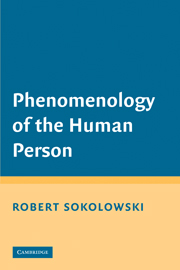Book contents
- Frontmatter
- Contents
- Acknowledgments
- Phenomenology of the Human Person
- Introduction
- PART I THE FORM OF THINKING
- PART II THE CONTENT OF THINKING
- 7 The Content of What Is Said
- 8 Properties and Accidents Reveal What Things Are
- 9 Knowing Things in Their Absence
- 10 Mental Representations
- 11 What Is a Concept and How Do We Focus on It?
- PART III THE BODY AND HUMAN ACTION
- PART IV ANCIENTS AND MODERNS
- 19 Conclusion, with Henry James
- Bibliography
- Index
7 - The Content of What Is Said
Essentials and Accidentals
Published online by Cambridge University Press: 05 June 2012
- Frontmatter
- Contents
- Acknowledgments
- Phenomenology of the Human Person
- Introduction
- PART I THE FORM OF THINKING
- PART II THE CONTENT OF THINKING
- 7 The Content of What Is Said
- 8 Properties and Accidents Reveal What Things Are
- 9 Knowing Things in Their Absence
- 10 Mental Representations
- 11 What Is a Concept and How Do We Focus on It?
- PART III THE BODY AND HUMAN ACTION
- PART IV ANCIENTS AND MODERNS
- 19 Conclusion, with Henry James
- Bibliography
- Index
Summary
We have been discussing the activity of human reason and hence of the human person, and most of what we have been saying has been related to the syntactical parts of speech. We have used the syntax of speech as a window through which we can get a philosophical look into the human person. The formal aspects of language elevate the voicing of pleasure and pain and the “speech” of protolanguage into human speech, and thus mark the presence of reason. But the formal aspects of language, obviously, do not subsist on their own; they are only formal. They are always set off against the content of speech; the syntax of language is played off against its semantics, just as consonants are played off against vowels. We now turn, therefore, to the material that is shaped by syntax, to the content encased by form. We turn to what is expressed, not by grammar, but by the rest of speech, by its nongrammatical dimensions or what we might call its lexicon: not by terms like and and therefore and is, but by terms like tree and automobile, leopard and horse.
Human reason works in this domain as well; it carries out differentiations within the content of what is said. It is not the case that reason's only work is to impose syntactic structures on undifferentiated, monochromatic contents or simple ideas.
- Type
- Chapter
- Information
- Phenomenology of the Human Person , pp. 99 - 116Publisher: Cambridge University PressPrint publication year: 2008



